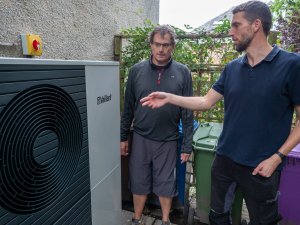Heat pumps are becoming a hot button topic. Most Scots support the phase out of fossil fuel boilers with 57% of Scots considering getting a heat pump – a trend particularly pronounced with young homeowners.
With increased news coverage there is also misinformation muddying the conversation.
Many criticisms directed at heat pumps are outdated and ignore the success of heat pumps in other countries. In fact, the UK trails behind most of Europe in the uptake of heat pumps which have long been popular in Nordic regions. Between 40% (Finland) and 60% (Norway) households use them, for example. And this year, heat pumps are surging in France and Italy, where they are used to meet both heating and cooling demand.
Heat pump owners are happy
Heat pumps today are efficient, quiet and comfortable, with a recent NESTA study reporting most UK heat pump owners (73%) are satisfied with their heat pump compared to their previous heating system.
They report, “heat pump users are highly satisfied with their heat pumps, considering them to be safe, reliable, quiet heat sources that are effective for space heating and producing hot water”
Heat Pumps work in cold climates
Households in Sweden, Norway and Finland have been switching to heat pumps since the 1970s, with Air Source Heat Pumps (ASHPs) especially popular due to cheaper, more convenient installation.
ASHPs operate well at sub-zero temperatures and can cover 100% space and water heating requirements. Households in very cold regions sometimes use supplementary heating on the coldest of days – this is unnecessary in Scotland. Even on the coldest Scottish day, a heat pump can warm your home and provide hot showers and baths.
Another option is a Ground Source Heat Pumps (GSHPs) which are especially efficient in cold temperatures, as they extract heat from underground which has a stable temperature. For homes with access to an appropriate water source, a Water Source Heat Pump (WSHP) is another highly efficient option.
Heat Pumps are energy efficient
In energy terms, heat pumps are around 3-4 times more efficient than gas boilers. This doesn’t translate to cost savings – electricity is more expensive than heavily subsidised gas.
However, as gas is phased out of the electricity grid, heat pumps are likely to become the cheapest, lowest carbon form of heating. When sensibly paired with other home improvements, they often do run more cheaply.
Heat pumps are appropriate for older buildings
A recent NESTA survey found that heat pump owners living in Victorian or older properties were 83% satisfied with their heat pump, even without extensive home upgrades. Another recent study found all housing types are suitable for electrification.
A large enough heat pump paired with sufficiently sized radiators and appropriate pipework can heat any building. However, homeowners often prepare for a smaller heat pump by lowering their heating needs with upgrades to the building fabric first.
Heat Pumps are safe
Many heat pumps have weekly sterilisation built in – an automatic setting where hot water temperatures temporarily goes up to 50 – 60 degrees. This is to prevent the growth of Legionella bacteria which thrives in stagnant water at 32-42 degrees and is dangerous.
Legionella is something to be aware of, but the risks are low. Regular domestic use means warm water is not stored for weeks on end. While heat pumps typically store hot water at a lower temperature than gas boilers, they have no problem producing the hot temperatures required to kill Legionella.
Heat Pumps are Quiet
Heat pump noise is around 50 db from 1m away, similar to a fridge. If you sit close a heat pump, you hear the gentle whirring from the fan: unobtrusive white noise. To listen for yourself, use this tool to test a heat pump – there is an audio recording and instructions for setting the noise level with a decibel app.
Underfloor Heating is fantastic – but not necessary
Underfloor heating pairs well with a heat pump. The gentle radiant warmth is fantastic for thermal comfort and efficiently distributes warmth throughout your home so there are no hot and cold spots.
But installing underfloor heating is also expensive, disruptive and not necessary. You can still achieve a healthy, warm, comfortable home with a heat pump and suitable radiators and pipes.
Get a home assessment for a smooth transition
The best way to make informed choices for your home is to get a home assessment. A retrofit assessor will calculate your energy needs, recommend appropriate home improvements, help you plan for a heat pump installation later down the line and help you choose the right heat pump for your home.
Home Assessments provide independent whole house planning and advice. Loco Home Retrofit CIC is an independent, non-profit climate action co-operative set up to help homeowners in Glasgow get off fossil fuels for good.


